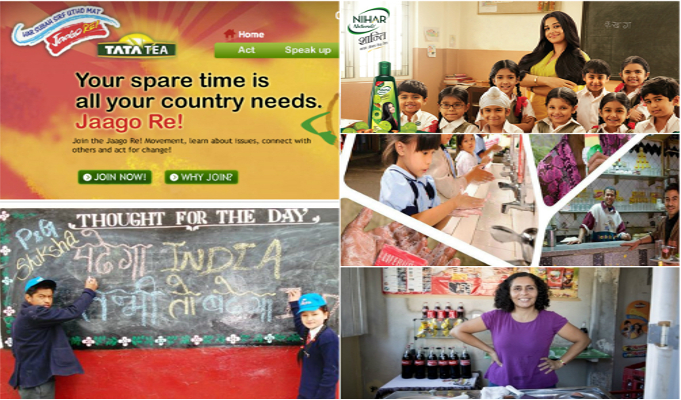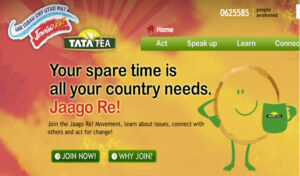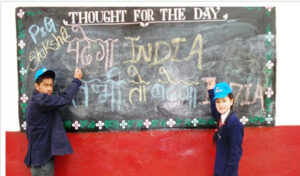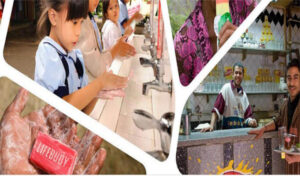For far too long, brands have been busy trying to sell to customers via the materialistic side of things. However, as consumers get more informed, engaged and vocal, brands are evolving with them, experimenting with innovative marketing ways to influence consumer buying decisions.
One such approach is linking a brand with a social cause which targets consumers’ rational minds and hearts and thus ultimately influences them to buy that brand. Marketers have even coined a term for it: ‘Cause Related Marketing(CRM)’.
One might confuse CRM with Corporate Social Responsibility (CSR), but it’s important to understand that cause marketing is done with an eye on the bottom line, while CSR is purely philanthropic.
Read: CSR by Brands: Best for society, better for products
From a brand’s perspective, connecting with a cause can build large diverse communities, create conversations, give long lasting recall and most importantly enable the brand to earn goodwill in the eyes of customers. In fact, studies show that consumers are willing to pay more for products from such companies.
A Nielsen Survey on Global Corporate Responsibility 2013, showed that 75 per cent of consumers – up from 56 per cent in 2011- were willing to spend more for products that support a cause. And this is in India which showed the maximum such consumers among developing nations that were surveyed.
Similarly, according to a Havas Media Report, more than 60 per cent of consumers in India care about the social impact of products, the effect of a product on society and would like their favorite brands to play a much larger role in society. So have Indian brands taken note of this?
Read: 5 retailers with the best CSR reputations in the world
While due to a restrictive mindset in India, brands are unable to leverage it fully, Indiaretailing Bureau takes a look at few retail brands in India who have effectively linked their sales to charity. And today, the campaigns have been integrated into the core of the brand’s messaging so much so, that many consumers recall them via their cause.
1Tata Tea’s Jaago Re
Considered as the poster child of CRM in India, Tata Tea’s ‘Jaago Re’ caused a revolution of sorts in the country by prodding and provoking an entire generation of Indians with its messages of empowerment. The campaign began in the year 2007-08; with the tagline ‘Har sub ab sirf utho math. Jaago re!’ (Don’t just get up every morning. Wake up!) in partnership with Janaagraha, a non-governmental organisation. The campaign undertook a pertinent issue of ‘Right to Vote’ and drove Indian youth towards voting booths.
Here’s how it was relevant. In India, tea is a product that is associated with the process of awakening. People get up in the morning and feel alert with that cup of tea, so Tata Tea wanted to stress on the physical, emotional and a social awakening, an awareness that could shake up the society, bringing about positive change.
The advertisements struck a chord with population at large and gathered more than one lakh registrations on their dedicated website (www.jaagore.com). The website complemented the main objective of the campaign that is to stimulate people to the need for change and casting vote as a means to bring about the change.
2P&G’s Shiksha
Shiksha began with P&G India’s research which revealed education as the one cause that consumers are most concerned about and are looking for a simple way to contribute to. With this insight and founded on P&G’s purpose, Shiksha was launched in 2005 to enable consumers to contribute towards the cause of education of under-privileged children through simple brand choices.
With the tagline ‘Padhega India toh Badhega India‘ the campaign, as per company’s website, has till date helped 280,000 underprivileged children access their right to education. The program has built and supported over 140 schools across India, in partnership with NGOs like Round Table India (RTI), Save the Children (STC), Army Wives Welfare Association (AWWA) and Navy Wives Welfare Association (NWWA), amongst others.
3HUL’s Help a child reach 5
Every year, two million children under five die of infections like diarrhoea and pneumonia. Hindustan Unilever, created a unique social campaign to create awareness on this disturbing statistic with its product Lifebuoy.
The Lifebuoy ‘Help a Child Reach 5’ on-ground handwashing behaviour change programme was started in 2013 in Thesgora, a village in Madhya Pradesh that has one of the highest rates of child diarrhoea in India. This programme created a significant impact, with mothers reporting reduction in incidence of diarrhoea from 36 per cent to 5 per cent, and 26 per cent more children washing their hands before meals.
4Coca Cola’s 5by20
5by20 is the Coca-Cola Company’s global commitment to enable the economic empowerment of 5 million women entrepreneurs across the company’s value chain by 2020.
Specifically, this means the small businesses that the Company and its bottling partners work with in more than 200 countries around the world—from fruit farmers and recyclers to retailers and artisans. The initiative has proved a win-win for both Coke as well as its women entrepreneurs.
In India, 5by20 is focused on building capabilities and providing access to resources to women entrepreneurs through four programs. First, the innovative eKOcool solar cooler program that provides income generation opportunities for low-income retailers in rural areas and entering untapped markets and increased sales for Coke.
The company also run a program called Pragati or “progress” that provides business skills training to women retailers also in rural areas. A third program, Parivartan or “positive change”, provides business skills training in mobile classrooms that travel throughout rural India. Project Unnati or “advance,” is enabling mango farmers to adopt Ultra High Density Farming (UDHP) techniques, allowing mango farmers to plant more trees in less space. As per the company’s website, more than 8,000 women have benefitted from these initiatives.
5Marico’s Nihar Naturals Shanti Amla brand of hair oil
Just like P&G, focus on education paid off for the the Mumbai-based FMCG company, Marico. The methodology is simple — 2per cent of the sales proceeds go towards funding the education of underprivileged children. All advertising and communication for the brand centres on the initiative — brand ambassador Vidya Balan’s TV commercials speak of the social cause — and the usual, ‘healthier hair’ message is almost given the go-by.
The brand has partnered with CRY sponsoring 19 projects across India and has provided education to more than 1,13,294 children in the first two years.It has now partnered with 3 organisations in the field of education. Sesame Worksop India (SWI) in UP, “Going to School” in Bihar & “Educate girls” in Rajasthan.












